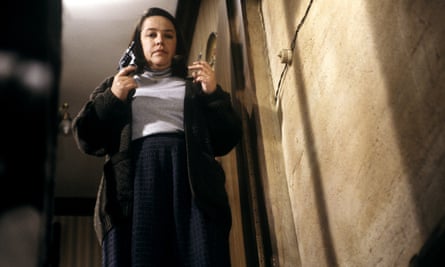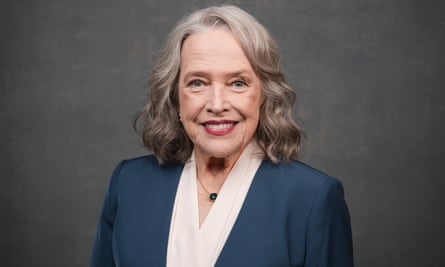Kathy Bates plays an elegant game in Sky’s new reboot of the 1980s legal drama Matlock. She’s the eponymous lawyer Matty, forced out of retirement having fallen upon hard times, thanks to her no-good husband. Or at least that’s what she says. There’s a lot of mischievous observation about ageism and the opportunities it presents: people look through her, so she can glide past security guards; people underestimate her, so she can bedevil them in negotiations; people shout over her like she isn’t there, so she destroys them in a way that’s pleasing to watch.
At first glance, this seems to be a straightforward whodunnit. But Bates would never have taken the role, she says, if that’s all there was to it. The show is certainly enjoyable, warming even, a bit like being hugged. Whether Madeline “Matty” Matlock is appearing in her assumed persona (cuddly, wise) or her true identity (passionate, crusading), she is always agreeably on the side of the angels. “We’ve had responses from people across all ages, across all demographics,” says Bates. “It is a comforting thing to be able to put your mind somewhere else, to something entertaining, that also has a bit of a mystery. People need that right now – to get away from everything and get lost.”
Bates, now 76, has come a long way. We’re speaking just after Halloween – and three people I know dressed up as Bates in Misery, the 1990 film about an obsessive fan who kidnaps, torments and eventually mutilates a famous author. It was epoch-makingly scary, won her an Oscar and properly launched her career, which had been highbrow but halting. Stephen King, who wrote the source book, went alone to a screening and at the end shouted: “Watch out, she has a gun!” to an empty room. It relaunched the career of James Caan, playing the writer, and according to Variety, helped “pave the way for torture porn a decade or so later”.

Matlock was written by Jennie Snyder Urman, creator and co-writer of artificial insemination romcom Jane the Virgin. The show has the satisfying clunk-click of Columbo, and the gently droll expectation-reversal of Murder She Wrote, with the homespun, sagacious grandma apparently out of her depth in the modern world among all the whip-smart young’uns, but whaddaya know, somehow she’s always one step ahead. And despite all Bates’s talk of escapism, Matlock effortlessly lands some pretty serious points. “Episode three was about sexual harassment,” Bates says. “The insight was that it’s not just the pain of being molested by a superior, of having no power, it’s also the choices you make after. What happens to young women, young actresses, traumatised by a professional encounter? Do they think, ‘Well, I just have to find a new career for myself’?”
This, in turn, is part of a broader story: Matty is a wealthy, successful retiree, sucked back in for one last job – avenging her daughter, who has died of an opioid overdose. She wants to get into the law firm to find out which corporate deadbeat buried the documents that could have prevented this tragedy. It’s a gruesomely compelling story, one that will be familiar to viewers of miniseries Dopesick, or readers of Barbara Kingsolver’s Pulitzer-prize-winning novel Demon Copperhead: toxically addictive drugs were flogged as a pharmaceutical magic bullet, with devastating results.
“All of this was going on way back in the early 00s,” Bates says. “Certainly, the Sacklers did so much damage. Their main argument was that people who were really in pain didn’t get addicted, which was ridiculous. They’re totally busted. There are still about 100,000 people dying of this.” Indeed, there were an estimated 108,000 drug overdose deaths in the US last year, of which 81,000 were opioid overdoses.
Bates is a searching person, who won’t be satisfied with gists and impressions. When it came to playing this grieving mother, she says, “I remember asking someone: ‘I don’t have a child, how do I do this?’ And my niece told me, ‘When you have a child, you’re savage about protecting that child.’ I dug for other things in my life: regrets, wishing I could go back and make a different choice. I hurt this person, or that person, the guilt that’s involved with it. We all have those things, I assume.”
Bates had brushed against the world of pain relief when she had ovarian cancer in 2003, and breast cancer in 2012. “I was in a lot of pain, for some reason. I think it was because, well, we don’t have to get too graphic about it. I kept asking for better medication and my doctors refused to give me what I wanted. Now I realise it was because of addiction: that hundreds of thousands of people had already become addicted. I took this one pill and – oh my God – my whole body was just gone. There was no pain anywhere. And I thought, ‘I get it. I get why people want this.’”

Bates was originally going to direct an episode of Matlock. In 2002, she directed episodes of the funeral home drama Six Feet Under, in which she starred as Bettina. “I loved doing it,” she says, “but I dropped out after I got sick with cancer and didn’t go back to it.” But Matlock was, she says, a whole new world. “I saw how difficult it was. The technical aspects of film-making have changed so much in the last 20 years. I saw what our wonderful director goes through, just energy-wise, to do these episodes. And I thought, ‘I shouldn’t do this.’ I know I made the right choice.”
She’s an executive producer on it, nevertheless, and watches the rushes with an impartial eye, finding it “delightful”. She is not self-conscious about watching herself: “I’m not just looking at my performance, I’m looking at the choices. It’s always with an eye to making things the best they can be. One can get too precious. I have friends who have never seen themselves on screen, or have been very selective about what they’ve watched. I think it’s a shame, because the work is so good and I wish they would see it and enjoy what they’ve accomplished.”
It’s complex, having a screen self. Bates once explained her long career with the declaration: “I’m not a stunning woman.” She was speaking to the New York Times just after Misery, and added: “I was never an ingenue. I’ve always just been a character actor.” In many ways, this is a golden age for such an actor: looking Hollywood-perfect is more of a garnish in a show that lives or dies on character.

There is some wonderful ensemble acting in Matlock. Skye P Marshall, as her steely boss and possible nemesis Olympia, is particularly noteworthy. Bates can be tantalisingly frank about screen mates from the past, who sadly go un-named. “I worked with someone not long ago who was not prepared,” she says. “It just enraged me, because it was just two of us. They were the lead. I felt it was very selfish, and kind of blind, not thinking about what they needed to do for the other actor. It was preposterous.”
When she moves on to talk about Marshall, the warmth returns. “One of my favourite Anne Tyler quotes is from The Accidental Tourist. I’m paraphrasing but Tyler has her narrator say, ‘It’s not whether he loved her, it’s that he loved who he was when he was with her.’ I think that’s what happens with all of us. We’re different with everybody we meet, and we meet people that rejuvenate us and make us excited about being in the world. But that’s rare. It’s rare for me to have this connection with Skye – and then for Matty to have it with Olympia.”
It’s a thought that brings her back to the theme of ageism. “One wants to feel useful,” Bates says. “What happens when you get older – certainly if you lose your job and find it impossible to get back into the workforce – is that you miss the feeling of being part of something, the feeling of being helpful.” She’s talking about her character, of course, but the whole show and her performance in it may yet be many kinds of helpful.

.png) 1 month ago
9
1 month ago
9













































